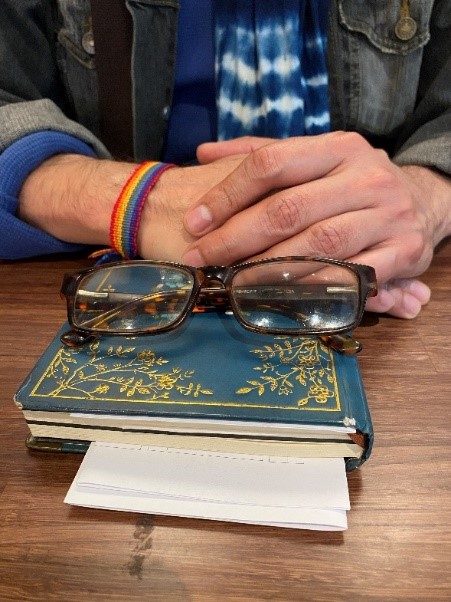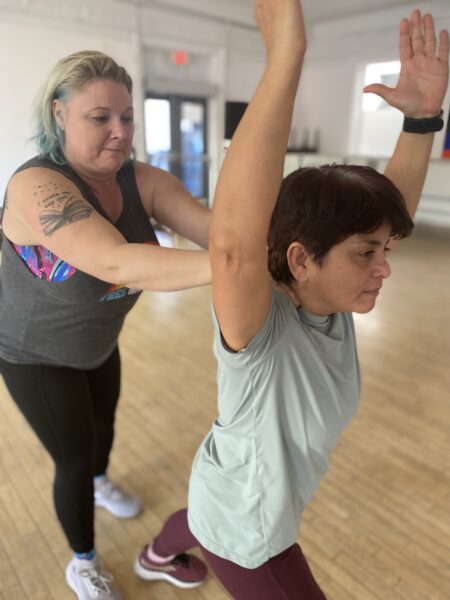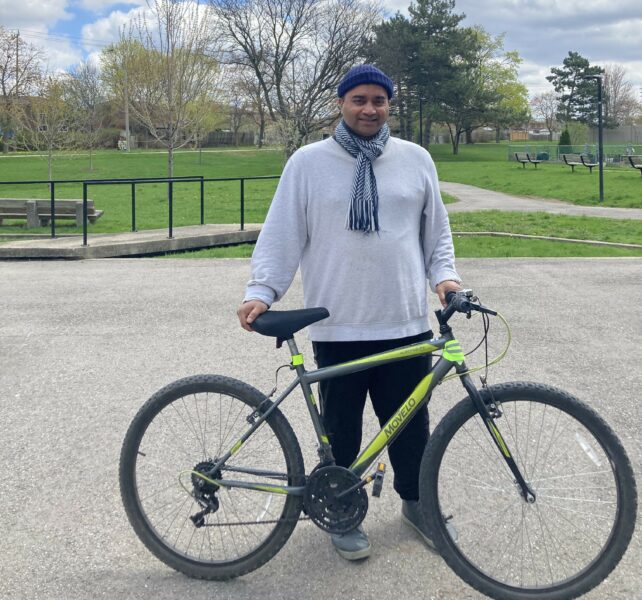Content Disclaimer: This blog post contains mention of rape and sexual assault. Reader discretion is advised.
Finding lasting safe and supportive housing is vital for many of our residents, especially for those who have faced discrimination and trauma in the past. Below is an interview with one of our supportive housing residents, shedding light on the journey of finding stability and acceptance in Toronto. His story is one of resilience and determination in the face of discrimination of his sexual orientation and hardship fleeing the persecution in his home country of El Salvador.
This interview was conducted by Ana Cisneros, Supervisor of Client Programming, Diversity and Inclusion.
Can you please share a little about yourself?
I am a resident of Homes First. My pronouns are he and him. I am 52 years old. I studied Public Relations and Advertising in El Salvador. I came to Canada in June 2008, as a gay refugee. I like going to the gym, reading gay novels and volunteering. Not long ago I volunteered for six months for the City of Toronto’s Human Resources Department, where I learned a lot.
When you first came to Canada, you moved in with some relatives. Can you tell us about that time?
I first arrived in Windsor and went to ESL school there.
[However], my family kicked me out about 3 weeks after my arrival because I was gay. Those were difficult moments because I never thought I would face homophobia from my own family in Canada; I thought they would protect me as they had been living in an open-minded country for so long. I had experienced living in the closet in El Salvador, since I was a little boy, so feeling rejection all over again was very painful. My parents did not know that I was gay. My siblings knew, and still now, they accept me as their brother, but wish I was not gay.
As a gay person, how difficult has it been for you to find stability and a home that you liked in Toronto?
This has been a very difficult and long journey for me. After being kicked out of my family’s house in Windsor, I moved to Niagara Falls. I was looking to work in the tourism industry, but I was required to be certified. There, I found a rooming house, with very little maintenance provided, but I managed to cope and stayed for more than a year. Then, I lived in London, and finally moved to Toronto, where I lived in too many places. It all has been a nightmare because of my sexual orientation.
So many people are still conservative and cruel against gay persons and [that] put me back in the closet. I learned not to disclose my sexual orientation to the landlords. It was also difficult because when you share a place, as a gay person, you might face harassment, bullying or rape from co-tenants if you do not comply. I never had the budget to rent a self-contained unit, only rooms in rooming housings.
I remember difficult moments when I found co-tenants that would try to hit me. I wouldn’t feel free to use the shared washroom, as they would use abusive or hate language. So, these incidents made me hide my true self. In my experience, as a gay person looking for a place to rent, negativity, judgement, rape, sudden eviction were all some of the situations faced. I also had to survive pest infestations of bed bugs and cockroaches.
The language barrier was another situation that limited my ability to advocate for myself. Once, I encountered a landlord that prohibited me to speak Spanish, because he did not like the language. So, on top of the challenges, I also had to endure racism and lack of privacy.

What services can Homes First provide in supportive housing to help our residents feel their best in their homes?
In my experience, finding support with agencies has been very important. For example, I found guidance, emotional and advocacy supports at the 519 Community Center and at the Canadian Center for Victims of Torture, during my refugee application immigration process and in connecting with Homes First Society. I am very grateful to Canada that handled my refugee immigration case with compassion.
I think everyone needs mental health support both personally and in the community. As a gay person, all I needed was to feel safe and welcomed. Connecting with other people is very important, so programming options can keep us without worrying too much about life. I think Homes First needs more partnerships to train residents in different fields. For example, I like going to the gym and exercising to cope with stress and sorrow that I feel sometimes. So, in my case, I would love it if Homes First looked for partnerships with gyms, so they can provide training for people who are interested in obtaining new skills. I would love to be a Personal Trainer.
Out of all the services offered by Homes First, which ones have been most helpful to you?
Being housed is the best thing that could have ever happened to me. I am grateful to have been chosen to live in a beautiful and clean apartment, in a nice and calm area, where nobody discriminates against me. The feeling of inclusiveness is peace and being part of a community. I understand that I am safe.
Also, I would love to have access to artistic activities, such concerts, musicals, movies, outings, trips, etc. or get discounts or passes. I would also like to get gift certificates to buy clothing or food. I would like to learn how to paint, draw, sing, dance or play a musical instrument.
The 2SLGBTQIA+ community needs to be housed in safe buildings where they can find social work support. I find that there are not enough safe spaces to live in the community for low income 2SLGBTQIA+ people. I ask Homes First and the City of Toronto to get more places like the one I live in, so our community can feel safe and welcome, as I do now.
Can you name 5 words to describe your emotional state in this very moment:
Happy
Friendly
Persistent
Self-care
Empathic
Homes First is committed to developing needs-informed, responsive programming by reflecting upon feedback from residents, staff and partners.


